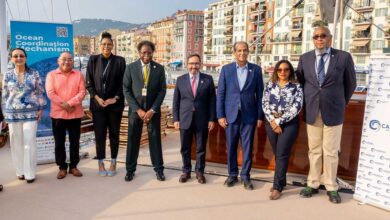(CARICOM Secretariat, Turkeyen, Greater Georgetown, Guyana) Even as the Small Island Developing States (SIDS) examined the issue of financing sustainable development for SIDS in Apia, Samoa, CARICOM Secretary-General Ambassador Irwin LaRocque has posited the need for new and innovative alternatives.
Moderating a side event titled “Financing for Sustainable Development in SIDS,” during the four-day international conference on Small Island Developing States, Ambassador LaRocque said there may be a role for innovative public and private financial instruments such as counter-cyclical loans, which temporarily halt existing debt service payments when shocks strike.
He highlighted financing instruments such as the Caribbean Catastrophe Risk Insurance Facility (CCRIF) that provide cash flow support immediately following an insured catastrophe, as well as financing opportunities presented by the recent rise in South-South Cooperation,
He stated: “Emerging' donors have become increasingly important sources of both aid and loan finance for many small island developing states. This development – which looks set to continue – provides SIDS with important opportunities to secure new and additional sources of development finance, as well as opportunities to learn from other countries' recent development experiences”.
“It is important to foster greater transparency in such flows, and to ensure that debt sustainability concerns are also kept in view,” the Secretary-General however cautioned.
Continuing on the issue of resource mobilization, Ambassador LaRocque acknowledged that improving domestic resource mobilization capacities was also important. He informed that everal SIDS have established special funds or programmes to channel more domestic resources to environmental and conservation programmes, but despite progress, challenges remain, and for many SIDS, domestic investment will need to be supplemented by international funding given the high up-front costs of many investments.
According to the Secretary-General, financing for development to reach set multilateral development goals required innovating instruments to mobilise domestic and international development funding that involve traditional and non-traditional donors, so as to increase private sector investment and public-private capital flows in support of development.
Noting that the overall financing needs for SIDS were not only large, but were also “very difficult” to quantify based on their level of vulnerability and exposure to external shocks, the CARICOM Secretary-General said that the Caribbean had been plagued with losses equivalent to over 1 percent of GDP to natural disasters since the early 1960s. He referenced Saint Lucia, St. Vincent and the Grenadines, and Dominica in which losses were estimated at US$108 million for St Vincent and the Grenadines and US$99 million for Saint Lucia in December 2013.
He added that while official Development Assistance (ODA) and climate finance were important sources of funds for many small island developing states, the proportion of overall aid allocated to SIDS was small, on the decline and heavily concentrated in just a few countries.
“Suffice it to say, more financing will be needed to support not only countries' long-term development, but also to address sudden major shocks such as the extreme weather events,” he said.
The Secretary-General stressed that the debt challenges facing many SIDs were compounded by the stance of the multilateral financial institutions regarding access to concessional resources by those states classified as middle income developing countries.
“The use of the narrow criteria of per capita gross national income in excess of US$1,035 (in 2013) to confer ‘middle income status’ on developing countries does not take into account the peculiar vulnerabilities, economic fragilities and lack of resilience of many SIDs including those in the Caribbean,” Secretary-General LaRocque also said.
The Caribbean Community had a high-level delegation at the Conference which included The Rt. Hon. Freundel Stuart, Prime Minister of Barbados; Dr. the Rt Hon. Keith Mitchell, Prime Minister of Grenada; on. Denzil Douglas, Prime Minister of St. Kitts and Nevis and Ministers of Government of CARICOM Member States.





